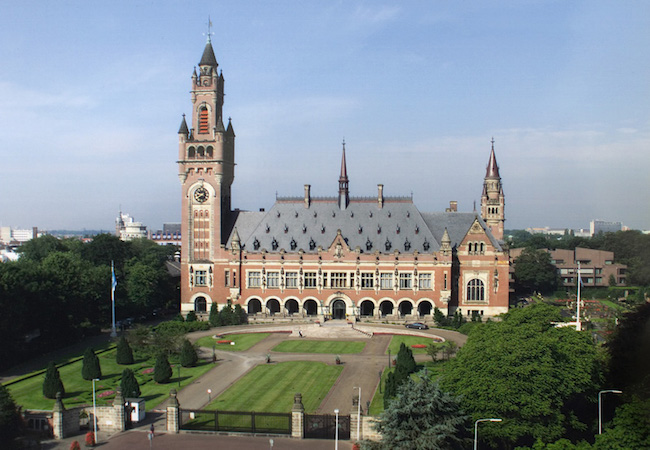
By Shakeel Ahmad
From 8 March to 16 March 2016, a public hearing is going to be held on Obligations concerning Negotiations relating to Cessation of the Nuclear Arms Race and to Nuclear Disarmament (Marshall Islands v. Pakistan) in The International Court of Justice (ICJ) at the Peace Palace in The Hague. Through an unofficial press release of ICJ issued on 29 January 2016, in this public hearing the jurisdiction and the admissibility of the application will be determined. Pakistani representative will try to repudiate the admissibility and the jurisdiction of The Court. Whereas, the Marshall Islands in its application has established the jurisdiction based on the declarations made by the Pakistan in accordance with Article 36, paragraph 2, of the Statute of the ICJ.
Earlier before, on 24 April 2014, the Republic of Marshal Islands had filed an application against Pakistan and eight other States claiming that these States had not fulfilled their obligation regarding nuclear disarmament and the cessation of the nuclear arms race. By a Note Verbale the Government of Pakistan had requested to extend the time for submission of its counter memorial. If the Marshal Islands establishes the Jurisdiction of the court than the Government of Pakistan will have to face the following allegations that Pakistan is (i) in continuing breach of its obligations under customary international law, including specifically its obligation to pursue in good faith negotiations to cease the nuclear arms race at an early date, as well as to pursue in good faith negotiations leading to nuclear disarmament in all its aspects under strict and effective international control; and (ii) in continuing breach of its obligation to perform its international legal obligations in good faith.
The Marshal Islands has established same claims against India as well, both countries are not party to NPT therefore major claims have been established under the Customary International Law. If Pakistan fails to establish non-jurisdiction of the Court than at the next stage it would be a real test of Pakistan’s diplomatic and legal intellect. Ahmer Bilal Soofi, advocate Supreme Court of Pakistan and Law Minster of Caretaker government of 2013 along with Mr. Moazzam Ahmad Khan, Pakistani Ambassador in the Hague, Netherland, are excellent representative and well prepared to challenge the jurisdiction of the ICJ and the admissibility the case.
In its application the Marshall Islands has claimed the jurisdiction based on the declarations made by the Pakistan in accordance with Article 36, paragraph 2, of the Statute of the ICJ and the Court is competent to entertain a dispute through the reciprocal effect of declarations. As on 13 September 1960, the Government of Pakistan had recognized the compulsory jurisdiction of the International Court of Justice in all legal disputes concerning any question of International law and any act regarding breach of an international obligation. It will not be an easy task for Pakistani representative to challenge the Court’s jurisdiction and same will be the situation of India as well.
In the matters related to international courts and arbitration Pakistan had been relying much on foreign legal experts by remunerating them extensively. However, the outcome has not always been in favour of Pakistan. For example, in its judgment in the case concerning the Aerial Incident of 10 August 1999 (Pakistan v. India), by a vote of fourteen to two, the Court declared that it had no jurisdiction to adjudicate upon the dispute brought before it by Pakistan against India. Moreover, in Indus Waters Kishenganga Arbitration, the court declared that India may accordingly divert water from the Kishenganga/Neelum River for power generation. By highlighting these cases I want to mention that in the past the issues involving the international courts and tribunals have hardly resulted into a success story. The fact of the matter is that the area of international law like the domestic courts is one of the most neglected areas of Ministry of Foreign Affairs, Ministry of Law and Justice as well as in the Pakistani academia.
In the Marshal Islands application against Pakistan the jurisdiction of the court is yet to be established therefore it is too early to refute and comment on the other claims relating to violation of customary international law and breach of international obligation regarding nuclear disarmament. Certainly, in such kind of matters the element of politics of international law cannot be ignored, however, at this stage it must be realized to strengthen the field of international law in related institutions of Pakistan. A time is approaching when the major decisions and the strategies of the States will be steered by considering the role and the jurisdiction of the international and regional Courts. Pakistan should keep itself prepared not only the battle grounds but also legal grounds.




